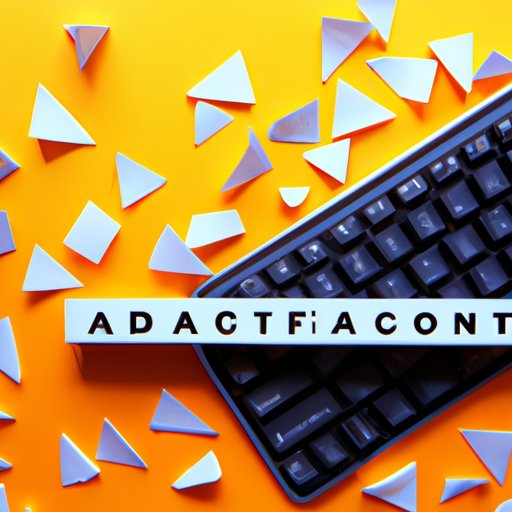
I. Introduction
Facebook is one of the most popular social media platforms in the world, providing people access to a network of friends, family, and acquaintances. However, some people may decide to take a break from social media to prioritize their privacy, mental health, or productivity. This article will provide a step-by-step guide to deactivating a Facebook account, along with reasons for why someone might choose to deactivate and alternative social media platforms to explore.
II. Step-by-Step Guide to Deactivating Your Facebook Account
If a person decides to deactivate their Facebook account, it is important to follow certain steps to make sure the process is done correctly. These clear and detailed steps will guide you through the process:
- Log in to your Facebook account
- Click on the downward-facing arrow in the upper right-hand corner of the page
- Select “Settings & Privacy”
- Click “Settings”
- Choose “Your Facebook Information” in the left-hand menu
- Select “Deactivation and Deletion”
- Choose “Deactivate Account” and answer the provided questions to confirm the process
Keep in mind that deactivating a Facebook account is only temporary and the account can be reactivated at any time.
III. Reasons to Deactivate Your Facebook Account
While Facebook can be a helpful tool for staying in touch with friends and family, there are many reasons why someone may choose to deactivate their account. Here are a few examples:
Privacy concerns
Facebook has been under scrutiny for the past few years due to data breaches and collecting user information without consent. By deactivating a Facebook account, a person can regain some control over their personal data.
Addiction and negative effects on mental health
Facebook can be addictive and affect a person’s mental health. Research has shown that social media use can lead to feelings of loneliness, isolation, and depression. By stepping away from Facebook, someone can focus on more fulfilling activities and face-to-face social interactions.
The benefits of taking a break from social media
Studies have shown that taking a break from social media can have positive impacts on a person’s life. A person can improve their well-being, connect with nature, and grow stronger relationships by learning to enjoy activities away from their phone or computer.
IV. Alternative Social Media Platforms
If someone chooses to deactivate their Facebook account, other social media platforms may be helpful for staying connected to their social circle. Here are a few alternative options:
Twitter is a platform focused on short-form content, where users can explore trending topics and engage in conversations with others.
Instagram is a photo and video-sharing platform where users can share pictures and videos with their followers. This platform focuses on visuals and allows users to follow someone they find interesting or inspirational.
LinkedIn is a professional networking platform where users can connect with colleagues, find job opportunities, and stay updated on industry news.
Pros and cons of alternative platforms
While these platforms can have unique features and benefits, they each have their own set of advantages and drawbacks. It is important to evaluate each option before choosing which one to adopt.
V. Tips for Staying Connected
Deactivating a Facebook account does not have to mean losing touch with friends and family. Here are some tips for staying connected:
Use messaging apps
Messaging apps like WhatsApp or Telegram allow users to send messages, share photos and files for free. They can also run mobile to mobile video calls and create group chats, functions that can be helpful in staying in touch with family and friends.
Use other platforms
People on other platforms like Instagram, Twitter or LinkedIn can create group chats and follow each other to stay updated on important news, updates, and life events.
Arrange meet-ups
Arranging meet-ups and social events like dinners, games, picnics and other activities bring people together so that they can interact and catch up.
VI. Personal Stories
Here are some true stories of people who deactivated their Facebook accounts and the benefits that they experienced:
Case study 1: John Doe, 35 years old
John, previously an avid Facebook user, felt that social media was taking too much of his time. He deactivated his account and found that he had more free time to take on other activities. He started to read books, walk his dog and began working on a business idea he had put on hold for a while. Though he misses it sometimes, he does not regret his decision.
Case study 2: Jane Smith, 25 years old
Jane felt that Facebook was taking a toll on her mental health. She was comparing herself to her friends and acquaintances, and it was leading her to feel more anxious and lonely. After deactivating her account, Jane found that she was able to focus more on herself and her goals. Though she misses being up to date on certain news and events, she feels more confident in herself since she left.
VII. The Benefits of Deactivating Your Facebook Account
Deactivating a Facebook account can have several positive outcomes. Here are a few examples:
Increased productivity and reduced stress
Without the distraction of constant updates, people can focus better on work or other hobbies and, therefore, be more productive.
Enhanced privacy and digital security
Deactivating a Facebook account means that personal information is removed from the platform, including individual data, interests and activities.
VIII. Conclusion
Deactivating a Facebook account does not have to be a difficult process, and there are many good reasons for doing it. Whether it is to improve privacy and security, to reduce stress and increase productivity, or to try out alternative social media platforms. This article has demonstrated a basic approach to deactivating Facebook accounts and shared alternative platforms as well as tips on how to connect with other people without Facebook. It is entirely up to the individual if they choose to deactivate their account, however, this is an appealing option to embrace for those who feel social media has become an addiction they face.





